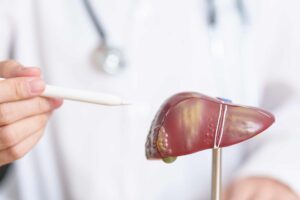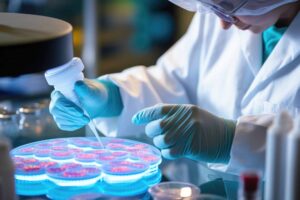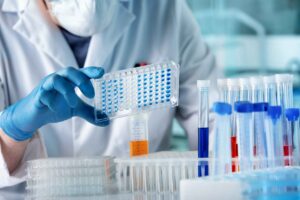• Antibiotic alternative
• Towards the clinic
What is already known on this topic
Infection with Clostridioides difficile (C. difficile), a bacterium that causes life-threatening inflammation of the gut, is an emerging threat caused by the use of broad-spectrum antibiotics. Previous studies have shown that the drug ebselen can stop C. difficile infection by targeting bacterial toxins rather than the bacterium itself.What this research adds
Researchers found that ebselen, which is already being tested in human clinical trials, protects rodents from C. difficile-associated tissue damage without altering the composition of the gut microbiota. After antibiotic treatment, the drug promotes recovery of the microbiota, which in turn alleviates gut inflammation.Conclusion
The findings support ebselen translation into the clinic for the treatment of C. difficile infection.
Infection with Clostridioides difficile (C. difficile), a bacterium that causes life-threatening inflammation of the gut, is an emerging threat caused by the use of broad-spectrum antibiotics. Now, researchers have found that ebselen, a drug already in human clinical trials, protects rodents from C. difficile-associated tissue damage and bolsters recovery of the microbiota after antibiotic treatment, further alleviating gut inflammation.
The findings, published in Cell Reports Medicine, support ebselen translation into the clinic for the treatment of C. difficile infection. “The anti-inflammatory properties of ebselen, combined with its anti-toxin function, help to mitigate the major clinical challenges of [C. difficile infection], including recurrence, microbial dysbiosis, and colitis,” say Matthew Bogyo at Stanford School of Medicine and his team, who conducted the research.
In 2015, in an attempt to combat C. difficile without using antibiotics, Bogyo and his colleagues looked for compounds that could stop C. difficile infection by targeting bacterial toxins rather than the bacterium itself. They focused on a drug called ebselen, which was already in clinical trials for conditions such as stroke.
This time around, the researchers set out to test the efficacy of ebselen in a hamster model of C. difficile infection.
Antibiotic alternative
The researchers first gave the rodents antibiotics to induce gut dysbiosis, then infected them with C. difficile.
Treatment with ebselen resulted in diminished inflammation and decreased tissue damage in the hamsters’ gut. The drug also reduced recurrence rates, with 4 of 10 hamsters surviving for at least 20 days.
Ebselen did not alter neither the diversity nor the composition of the rodents’ gut microbiota. On the contrary, the drug promoted recovery of the microbiota after antibiotic treatment in both healthy hamsters and those infected with C. difficile.
Towards the clinic
The team found that most rodents treated with ebselen and the antibiotic vancomycin recovered, while all of the rodents treated only with vancomycin continued to have an altered gut microbiota. Recovery of the microbiota appeared to further alleviate gut inflammation.
“Together with our previous work, we show that treatment with the orally administered compound ebselen reduces short-term colitis caused by [C. difficile infection],” the researchers say. The drug, they add, also reduces disease recurrence and gut dysbiosis associated with antibiotic treatment.
Together, the findings suggest that ebselen can be used to prevent severe inflammation of the gut in people at high risk of C. difficile infection, the researchers say.











